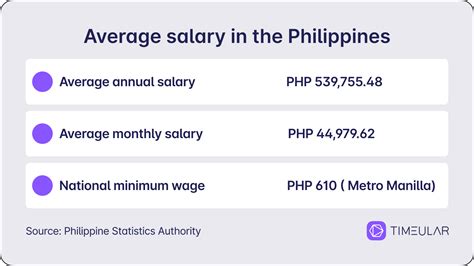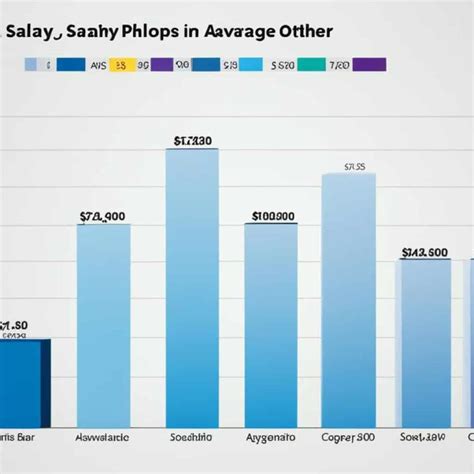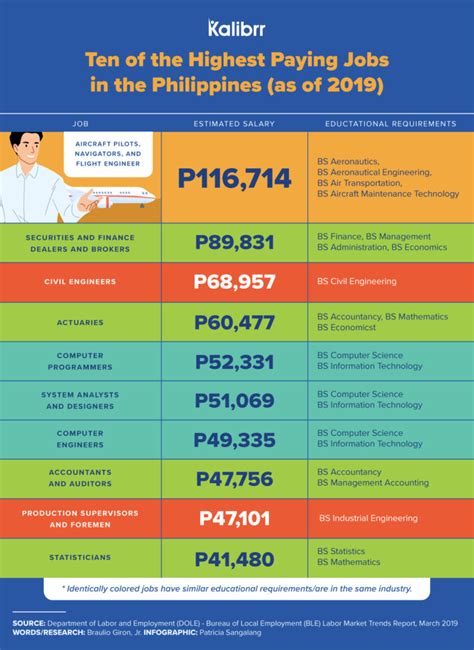Navigating the job market in the Philippines requires a clear understanding of its dynamic economic landscape. For students planning their future and professionals considering a career move, one of the most pressing questions is: "What can I expect to earn?" The Philippines, with its rapidly growing economy and diverse industries, offers a wide spectrum of opportunities. While a single "average salary" figure provides a starting point, the real story lies in the details.
This guide will break down the average salary in the Philippines, explore the key factors that dictate your earning potential, and provide a data-driven look at what you can expect in your career journey.
What is the 'Average Salary' in the Philippines?

Before diving into the numbers, it's crucial to understand what the "average salary" represents. This figure is a statistical measure—typically the mean—calculated from a vast range of jobs across all industries, experience levels, and geographical locations. It includes everything from entry-level service roles to C-suite executive positions.
Therefore, while the national average is a useful economic indicator, it is not a definitive salary for any single individual. Think of it as a baseline. Your personal earning potential will be shaped by a unique combination of your skills, experience, and strategic career choices.
Average Salary in the Philippines: The National Benchmark

According to the most recent data, the salary landscape in the Philippines is broad. It's often more practical to look at the median salary, as it is less skewed by a small number of extremely high earners.
- National Average Salary: Salary aggregator Payscale, as of late 2023, reports the average base salary in the Philippines to be approximately PHP 362,000 per year, which translates to about PHP 30,167 per month.
- Official Government Data: The Philippine Statistics Authority (PSA), in its 2022 Occupational Wages Survey, reported that the average monthly wage rate for full-time employees was PHP 18,423. The disparity between sources often reflects different calculation methods and data sets (e.g., online salary profiles vs. formal establishment surveys).
- Typical Salary Range: A realistic salary spectrum in the Philippines spans from around PHP 15,000/month for many entry-level positions to well over PHP 150,000/month for experienced professionals in high-demand fields and senior management roles.
Source Citation: *Philippine Statistics Authority (PSA) 2022 Occupational Wages Survey; Payscale.com (Data accessed 2024).*
Key Factors That Influence Salary

Your salary isn't a fixed number; it's a dynamic figure influenced by several critical factors. Understanding these levers is the key to maximizing your earning potential.
### Level of Education
Your educational attainment is a foundational pillar of your career value. Generally, higher and more specialized education correlates with higher earning potential.
- High School Diploma: Qualifies candidates for essential entry-level roles but typically commands salaries at the lower end of the spectrum.
- Bachelor's Degree: This is the standard requirement for most professional and corporate jobs in the Philippines and significantly increases earning potential compared to a high school diploma.
- Master's Degree / MBA: A postgraduate degree signals deep expertise and is often a prerequisite for senior leadership, research, and highly specialized technical roles, commanding a significant salary premium. For example, a professional with an MBA can often earn 50-100% more than their Bachelor's-level counterparts in the same field.
### Years of Experience
Experience is perhaps the most significant determinant of salary growth throughout your career. Employers pay a premium for proven skills and a track record of success.
- Entry-Level (0-2 years): Professionals in this stage are learning the fundamentals. Salaries are typically closer to the starting wage for their industry. For a fresh graduate in IT, this might be in the PHP 25,000 - PHP 40,000/month range.
- Mid-Career (3-8 years): With several years of hands-on experience, professionals become more independent and valuable. They can expect a substantial increase in salary. The IT professional mentioned above could now be earning PHP 60,000 - PHP 90,000/month as a mid-level developer or specialist.
- Senior/Experienced (8+ years): At this level, professionals are often in leadership, management, or principal expert roles. Their deep industry knowledge and strategic contributions command top-tier salaries, often exceeding PHP 100,000 - PHP 150,000/month or more.
### Geographic Location
Where you work in the Philippines plays a massive role in your salary. This is driven by the concentration of businesses and the corresponding cost of living.
- National Capital Region (NCR): Metro Manila is the country's economic hub. It hosts the headquarters of most multinational corporations (MNCs) and large local companies. As such, salaries in the NCR are the highest in the country, often 20-40% higher than in other regions, to compensate for the significantly higher cost of living.
- Major Urban Centers (Cebu, Davao): These cities are rapidly growing economic centers with thriving BPO, IT, and real estate sectors. Salaries here are competitive and higher than in surrounding provinces, though typically still below Manila's benchmark.
- Provincial/Rural Areas: Salaries in these regions are generally lower, reflecting a lower cost of living and a different mix of local industries, which are often centered on agriculture, small-scale manufacturing, and local services.
### Company Type
The type of company you work for is a major salary driver.
- Multinational Corporations (MNCs): These companies are typically the top paymasters. They offer globally competitive salary packages, comprehensive benefits (e.g., extensive health coverage, bonuses), and structured career progression paths.
- Large Local Corporations: Established Filipino companies (e.g., in banking, real estate, and consumer goods) also offer competitive salaries and strong benefits, though they might be slightly below MNC levels.
- Small and Medium-Sized Enterprises (SMEs): SMEs form the backbone of the Philippine economy. While they may offer lower base salaries than large corporations, they can provide invaluable experience, greater responsibility early on, and a more agile work environment.
- Startups: Tech and digital startups might offer modest base salaries but can compensate with stock options (equity), performance-based bonuses, and the potential for rapid career growth.
### Area of Specialization / Industry
Your chosen industry and role are paramount. In-demand skills will always command a premium. According to data from salary aggregators like Glassdoor and Salary.com, these industries consistently rank among the highest paying in the Philippines:
- Information Technology (IT) and Software Development: This sector is booming. Roles like Data Scientist, Cloud Engineer, Cybersecurity Analyst, and Senior Software Developer can command salaries from PHP 80,000 to over PHP 200,000/month depending on expertise.
- Finance and Banking: Professionals in corporate finance, investment banking, and financial analysis are highly compensated for their specialized skills.
- Business Process Outsourcing (BPO): While entry-level roles have modest starting pay, management and specialized positions (e.g., Operations Manager, Quality Assurance Lead, IT support for BPO) offer lucrative career paths.
- Engineering: Licensed engineers, particularly those in specialized fields like chemical, petroleum, or project management for large construction projects, have high earning potential.
Job Outlook

The job outlook for the Philippines remains positive and is characterized by dynamic growth in key sectors. While the U.S. Bureau of Labor Statistics (BLS) does not cover the Philippines, reports from the World Bank and the Asian Development Bank (ADB) consistently project strong GDP growth for the country.
This economic expansion is expected to fuel job creation, particularly in the following areas:
- IT-BPM Sector: The Information Technology and Business Process Management industry continues to be a massive source of employment and is moving up the value chain into higher-skilled services.
- Digital Economy: E-commerce, fintech, and digital marketing are creating a wave of new roles requiring digital literacy and specialized skills.
- Construction and Infrastructure: Government and private sector projects continue to drive demand for engineers, project managers, and skilled trades.
- Tourism and Hospitality: As a key pillar of the economy, this sector is rebounding and offers extensive opportunities.
Conclusion: Charting Your Career Path

The "average salary" in the Philippines is a single data point in a complex and exciting professional landscape. The key takeaway is that you have significant control over your earning potential.
For those starting their journey, the path to a high salary is clear:
1. Invest in Education: Pursue a degree and certifications in a field with strong demand.
2. Gain High-Value Experience: Focus on acquiring skills that are critical to your industry's growth.
3. Be Strategic About Location and Company: Target high-growth areas like the NCR and aim for companies, whether MNCs or promising startups, that align with your career goals.
4. Never Stop Learning: The most successful professionals continuously adapt and upskill to stay relevant.
By understanding these factors and making strategic decisions, you can navigate the Philippine job market effectively and build a prosperous and fulfilling career that far exceeds the national average.
